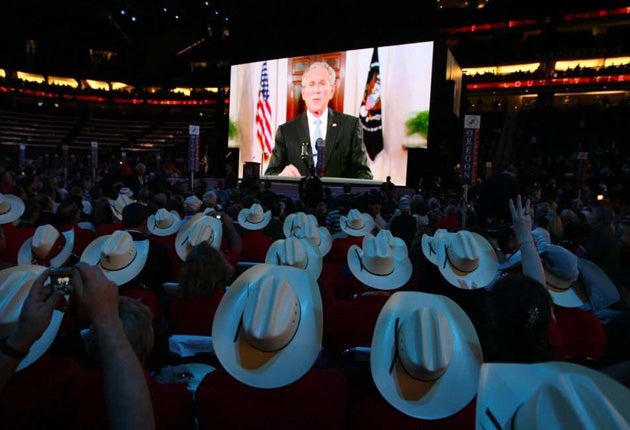Attacks on media reveal Republican jitters over Palin

Sarah Palin, the Alaskan Governor selected by John McCain as his running mate, hit back at the media last night, telling her critics to stop raking through her family and political history.
As Mrs Palin took centre stage at the Republican National Convention in St Paul, Minnesota, to accept the nomination as potential vice-president, she said: "I'm not a member of the permanent political establishment. And I've learned quickly, these past few days, that if you're not a member in good standing of the Washington elite, then some in the media consider a candidate unqualified for that reason alone.
"But here's a little news flash for all those reporters and commentators: I'm not going to Washington to seek their good opinion – I'm going to Washington to serve the people of this country."
Before Mrs Palin gave her speech, one of her top aides told broadcasters to leave her alone. "This nonsense is over," he said.
Mrs Palin's speech was a bold assault that betrayed a growing unease among Republican campaign managers that the frenzy of reporting about the Governor and her family could spin out of control and severely damage Mr McCain and his running-mate. But it also fuelled speculation there might be more damaging revelations waiting to pop out from Mrs Palin's deep cupboard of surprises.
A warning came from their most senior campaign enforcer, Steve Schmidt, a protégé of Karl Rove, former aide to George Bush. He accused journalists of creating a "faux media scandal designed to destroy the first female Republican nominee" for the vice-presidency.
Contributing to Republican jitters is the gradual but steady progress Barack Obama has been making in the polls since the end of the Democratic convention in Denver. For the first time in the campaign, Mr Obama broke the 50 per cent threshold of support.
Last night's speech was a make-or-break moment for the 44-year-old Alaska Governor and for the whole campaign. After being held behind closed doors by a nervous campaign, she used the moment to redefine herself to voters. That she would get a rapturous reception in the hall was not in doubt. How she will play in the rest of the country is another matter.
With her admonition to the press, the campaign was, for the first time, acknowledging that it has taken some heavy hits since Mrs Palin was brought on to the ticket less than a week ago. Those have included news of the pregnancy of her daughter, Bristol, 17. She and Levi Johnston, the father of the unborn child, were at the arena last night to see her speak. Todd Palin, the Governor's husband, who has become known in Alaska as "First Dude", had also flown in for the speech.
But a fast trickle of other details have been coming to light that are worrying the Republicans and have fed the impression that the decision to select Mrs Palin was last minute and the vetting of her was rushed.
These include news that Todd Palin belonged to the radical Alaska Nationalist Party, that the Governor hired a lawyer to defend her in an ethics inquiry ordered by the state legislature and that, as mayor of Wasilla, she hired a lobbyist in Washington to steer so-called "earmarks" – gifts of federal money – to her town, a practice especially favoured by Alaskans that has been derided by Mr McCain.
It emerged earlier yesterday, meanwhile, that the main vetting interview of Mrs Palin took place in Arizona only last Wednesday, one day before Mr McCain offered her his No.2 spot. It is speculation that the vetting was botched that seems now to be getting under the campaign's skin the most. "The McCain campaign will have no further comment about our long and thorough process," Mr Schmidt said, before adding that the media was run by "the old boys' network".
It marks a strange, if not entirely unpredictable, collapse of what, for years, has been an unusually symbiotic relationship between Mr McCain and the press. His willingness to invite reporters close while on the road and discuss almost any topic with them was well known, and was said to explain why he enjoyed mostly positive coverage.
This week has seen a steadily growing chorus of attacks by the McCain campaign team. On Tuesday, they told CNN they were withdrawing the candidate from a promised interview with Larry King because they did not like the tone of an interview earlier in the day with a campaign spokesman about Mrs Palin.
The chief spokesman for Mr Obama, Robert Gibbs, acknowledged that Mrs Palin would make a "great speech". However, he noted that she had supported Alaska receiving federal money for the so-called "bridge to nowhere", before retracting that support. The bridge project, which was stillborn, is held by Mr McCain as a symbol of the government wasting money.
Obama breaks 50% barrier
The Obama campaign finally broke through the 50 percentage point barrier yesterday. Observers had been openly questioning the Illinois senator's ability to "close the deal" and convert anti-Republican public sentiment into a strong lead over his rival John McCain. A smaller than expected bounce in the polls after the Democrat convention last week sparked fresh fears, but the Gallup daily tracking poll found that since the convention, support for Mr Obama has risen by five percentage points and he now leads Mr McCain by 50 per cent to 42 per cent.
Join our commenting forum
Join thought-provoking conversations, follow other Independent readers and see their replies
0Comments